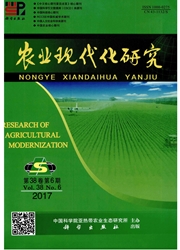

 中文摘要:
中文摘要:
为了能够充分汲取我国农村在探索科学发展过程中的经验教训,促使我国农村抓住当前的历史机遇实现科学发展,采用历史分析法,识别和总结新中国成立以来我国农村科学发展五次重要历史机遇的社会背景和政策要点。这五次历史机遇分别是建国初期农村的土地改革和互助合作、三年困难时期农村发展的调整、十一届三中全会后农村经济和政治体制改革、十五届三中全会后农村税费改革和统筹城乡发展、十八大后全面深化农村改革。但是,改革开放前的"左"倾思想和城乡二元结构的深远影响严重制约了农村科学发展的进程。一方面,超越了基本国情的社会经济政策挫伤了广大农民的生产积极性,抑制了农业生产力的发展。另一方面,城乡之间的要素交流和良性互动被制度性割裂,导致城乡之间的社会经济差距不断扩大。基于此,提出了正确处理人与自然、经济与社会、农村与城市三种关系,坚持以人为本、促进人的全面发展,坚持要素投入和制度创新相结合等政策建议。
 英文摘要:
英文摘要:
In order to fully absorb the experience and lessons of rural China exploring scientific development and promote rural China seizing the current historical opportunity to realize scientific development, the paper using the historical analysis method, identified and summarized the historical background and policy focus of rural China's five important scientific development opportunities since the founding of new China. The five development opportunities were rural land reform and cooperative at the beginning of new China, rural development adjustment in three years of difficult period, rural economic and political system reform after The Third Plenary Session of the Eleventh Central Committee of Communist Party of China (CPC), rural taxes and fees reform and balancing urban-rural development polices after The Third Plenary Session of the Fifth Central Committee of CPC, deepening rural reform in an all-round way after The Eighteenth National Congress of CPC. However, the scientific development process in rural areas was restricted seriously by the far-reaching influence of "left" leans errors and dual structure between urban and rural areas. On the one hand, the social and economic policy beyond the basic national conditions in china discouraged the enthusiasm of peasants for production and restrained the development of agricultural productivity. On the other hand, the elements communication and positive interaction between urban and rural areas were systematically separated, leading to growing social and economic disparity between urban and rural areas. In the above analysis foundation, the paper put forward the main policy suggestions: correctly handling the relationship between human and nature, correctly handling the relationship between economy and society, correctly handling the relationship between urban and rural areas, adhering to the people-oriented to promote the all-round development of people, adhering to the combination of factor input and system innovation.
 同期刊论文项目
同期刊论文项目
 同项目期刊论文
同项目期刊论文
 期刊信息
期刊信息
